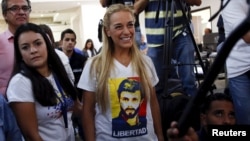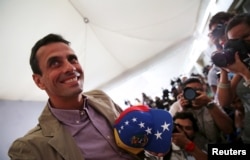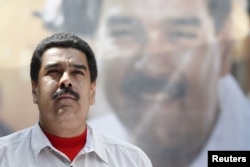In a side room of an affluent Caracas hotel, the wife of jailed opposition leader Leopoldo Lopez locked hands with the spouses of other detained politicians on Sunday night as they waited for the results of Venezuela's legislative elections.
When it became clear the opposition had claimed a crushing victory, fireworks and screams erupted around them.
Defeated at the polls time and again during 17 years of "Chavismo," the leftist movement founded by late leader Hugo Chavez, the opposition now hopes the days of Socialist rule are numbered.
"Finally we've glimpsed the light," beamed student Yelimar Bayona, 22, as gleeful supporters hugged in the heavily-guarded hotel. "Now we can achieve anything."
Opposition lawmakers will quickly push to free jailed opponents of the government and limit the power and policies of socialist President Nicolas Maduro, but to go much further they will need to keep locking arms to avoid the in-fighting that for long weakened them.
"Now is when we need to be united," Democratic Unity coalition head Jesus Torrealba said after his bloc's win.
Dogged by a reputation for elitism and coup-mongering after the brief 2002 overthrow of Chavez, foes of "Chavismo" have long struggled to connect with ordinary voters.
The movement has also split between radicals who launched street protests last year to demand Maduro's removal and moderates who say the demonstrations were poorly-planned and hurt the broader opposition movement by triggering violent clashes that killed dozens.
A disparate coalition of more than two dozen parties, held together by a burning desire to unseat "Chavismo," the opposition also has no clear leader.
Hardliners pine for the release of Lopez, a U.S.-educated activist who led last year's street movement. His wife Lilian Tintori, an ex-kite surfing champion, is the face of a well-oiled global campaign for his release.
Some in the more moderate factions, meanwhile, support former presidential candidate Henrique Capriles, who chose not to take to the streets despite claiming fraud in the 2013 election that he narrowly lost to Maduro.
Coalition leader Torrealba has the thankless task of containing the many egos and political agendas, but discord could emerge as anxious politicians finally get their long-coveted political platform and feel the heat from constituents.
Having punished the government over economic problems, voter hopes for change are high, especially as the opposition looks likely to have a big majority and can take aim at a government it says is incompetent and dictatorial.
With results not yet in from 22 legislative elections, Democratic Unity won 99 seats to the Socialists' 46, meaning it will almost certainly win a three-fifths majority and possibly two-thirds: both significant hurdles in terms of the power it can exercise.
Even so, without executive powers, the opposition cannot overhaul the OPEC country's reeling economy - Venezuelans' No. 1 concern and the main reason voters overwhelmingly turned against Maduro's candidates.
That vote of anger decided the election on Sunday rather than an overwhelming endorsement of the opposition, which had not drawn up clear policy proposals to rebuild the shaken economy.
"Chavismo," long united under the larger-than-life and domineering Chavez, frequently pokes fun at the opposition's inner fissures.
"There's not one opposition in Venezuela, there are many," Socialist Party heavyweight Elias Jaua said recently.
'Disparate Bunch'
Maduro quickly accepted defeat early on Monday, diffusing tensions in the polarized country, though he snubbed the opposition's own merits in beating his Socialist Party and allies.
"A counter-revolution has temporarily triumphed," a solemn-faced Maduro said in a televised broadcast, flanked by the Venezuelan flag and several Socialist candidates.
He claimed businesses and opponents had deliberately wrecked the economy by creating product shortages and pushing up prices.
As Chavez did before him, Maduro may now try to sidestep the National Assembly to prevent the opposition wielding its new-found power.
The coalition has said it wants to prioritize laws to free jailed activists and alleviate the economic crisis by stimulating production, reversing nationalizations, increasing the central bank's autonomy and improving salaries and pensions.
Yet economists see no quick fix for problems rooted in rigid currency and price controls and the country's dependence on oil.
Measures to boost Venezuela's ailing state coffers - by raising the world's cheapest gasoline prices, for instance - could stoke already dizzying inflation and spark unrest.
The likelihood of economic change hinges on whether a chastened Maduro decides to cooperate with his rivals and reform the economy, or instead bunkers down to deepen controls.
The opposition said on Monday there would be no "witch hunt" against foes, and welcomed disenchanted "Chavistas" to join them.
Should the government block its legislative initiatives, however, the coalition says it could push for a recall referendum - allowed in 2016 half-way through Maduro's term if around 4 million voters sign petitions in support of it.
In the immediate run-up to the January inauguration of the new National Assembly, the opposition's most delicate balancing act may well be managing fast-rising expectations for change.
"We can't bring down the price of food, we can't fill the shelves with food," opposition leader Henry Ramos, touted as a possible leader of the new assembly, told reporters.
"What we can do is pass laws that will definitely have to be applied by this no-good government."







